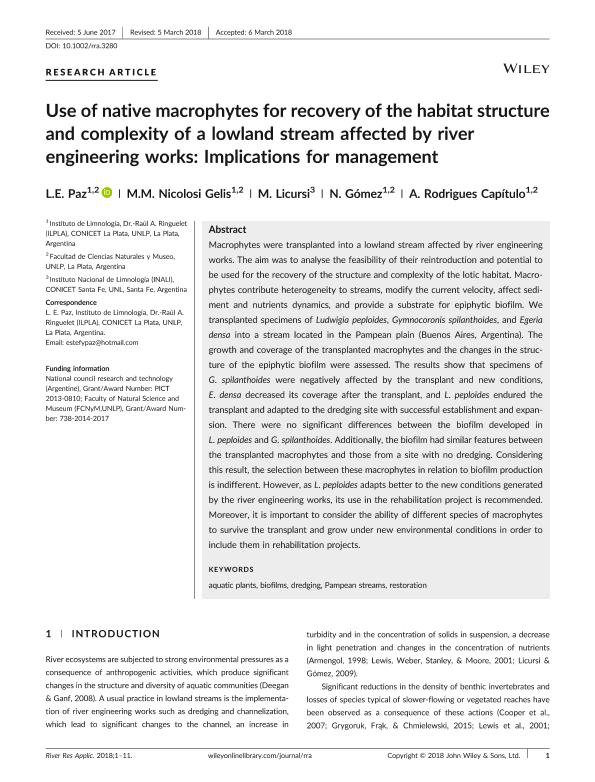Mostrar el registro sencillo del ítem
dc.contributor.author
Paz, Laura Estefania

dc.contributor.author
Nicolosi Gelis, María Mercedes

dc.contributor.author
Licursi, Magdalena

dc.contributor.author
Gomez, Nora

dc.contributor.author
Rodrigues Capitulo, Alberto

dc.date.available
2019-10-04T17:46:32Z
dc.date.issued
2018-07
dc.identifier.citation
Paz, Laura Estefania; Nicolosi Gelis, María Mercedes; Licursi, Magdalena; Gomez, Nora; Rodrigues Capitulo, Alberto; Use of native macrophytes for recovery of the habitat structure and complexity of a lowland stream affected by river engineering works: Implications for management; John Wiley & Sons Ltd; River Research And Applications; 34; 6; 7-2018; 575-585
dc.identifier.issn
1535-1459
dc.identifier.uri
http://hdl.handle.net/11336/85232
dc.description.abstract
Macrophytes were transplanted into a lowland stream affected by river engineering works. The aim was to analyse the feasibility of their reintroduction and potential to be used for the recovery of the structure and complexity of the lotic habitat. Macrophytes contribute heterogeneity to streams, modify the current velocity, affect sediment and nutrients dynamics, and provide a substrate for epiphytic biofilm. We transplanted specimens of Ludwigia peploides, Gymnocoronis spilanthoides, and Egeria densa into a stream located in the Pampean plain (Buenos Aires, Argentina). The growth and coverage of the transplanted macrophytes and the changes in the structure of the epiphytic biofilm were assessed. The results show that specimens of G. spilanthoides were negatively affected by the transplant and new conditions, E. densa decreased its coverage after the transplant, and L. peploides endured the transplant and adapted to the dredging site with successful establishment and expansion. There were no significant differences between the biofilm developed in L. peploides and G. spilanthoides. Additionally, the biofilm had similar features between the transplanted macrophytes and those from a site with no dredging. Considering this result, the selection between these macrophytes in relation to biofilm production is indifferent. However, as L. peploides adapts better to the new conditions generated by the river engineering works, its use in the rehabilitation project is recommended. Moreover, it is important to consider the ability of different species of macrophytes to survive the transplant and grow under new environmental conditions in order to include them in rehabilitation projects.
dc.format
application/pdf
dc.language.iso
eng
dc.publisher
John Wiley & Sons Ltd

dc.rights
info:eu-repo/semantics/openAccess
dc.rights.uri
https://creativecommons.org/licenses/by-nc-sa/2.5/ar/
dc.subject
AQUATIC PLANTS
dc.subject
BIOFILMS
dc.subject
DREDGING
dc.subject
PAMPEAN STREAMS
dc.subject
RESTORATION
dc.subject.classification
Ciencias Medioambientales

dc.subject.classification
Ciencias de la Tierra y relacionadas con el Medio Ambiente

dc.subject.classification
CIENCIAS NATURALES Y EXACTAS

dc.title
Use of native macrophytes for recovery of the habitat structure and complexity of a lowland stream affected by river engineering works: Implications for management
dc.type
info:eu-repo/semantics/article
dc.type
info:ar-repo/semantics/artículo
dc.type
info:eu-repo/semantics/publishedVersion
dc.date.updated
2019-09-27T17:08:46Z
dc.journal.volume
34
dc.journal.number
6
dc.journal.pagination
575-585
dc.journal.pais
Reino Unido

dc.journal.ciudad
Londres
dc.description.fil
Fil: Paz, Laura Estefania. Consejo Nacional de Investigaciones Científicas y Técnicas. Centro Científico Tecnológico Conicet - La Plata. Instituto de Limnología "Dr. Raúl A. Ringuelet". Universidad Nacional de La Plata. Facultad de Ciencias Naturales y Museo. Instituto de Limnología; Argentina
dc.description.fil
Fil: Nicolosi Gelis, María Mercedes. Consejo Nacional de Investigaciones Científicas y Técnicas. Centro Científico Tecnológico Conicet - La Plata. Instituto de Limnología "Dr. Raúl A. Ringuelet". Universidad Nacional de La Plata. Facultad de Ciencias Naturales y Museo. Instituto de Limnología; Argentina
dc.description.fil
Fil: Licursi, Magdalena. Consejo Nacional de Investigaciones Científicas y Técnicas. Centro Científico Tecnológico Conicet - Santa Fe. Instituto Nacional de Limnología. Universidad Nacional del Litoral. Instituto Nacional de Limnología; Argentina
dc.description.fil
Fil: Gomez, Nora. Consejo Nacional de Investigaciones Científicas y Técnicas. Centro Científico Tecnológico Conicet - La Plata. Instituto de Limnología "Dr. Raúl A. Ringuelet". Universidad Nacional de La Plata. Facultad de Ciencias Naturales y Museo. Instituto de Limnología; Argentina
dc.description.fil
Fil: Rodrigues Capitulo, Alberto. Consejo Nacional de Investigaciones Científicas y Técnicas. Centro Científico Tecnológico Conicet - La Plata. Instituto de Limnología "Dr. Raúl A. Ringuelet". Universidad Nacional de La Plata. Facultad de Ciencias Naturales y Museo. Instituto de Limnología; Argentina
dc.journal.title
River Research And Applications

dc.relation.alternativeid
info:eu-repo/semantics/altIdentifier/url/https://onlinelibrary.wiley.com/doi/full/10.1002/rra.3280
dc.relation.alternativeid
info:eu-repo/semantics/altIdentifier/doi/http://dx.doi.org/10.1002/rra.3280
Archivos asociados
